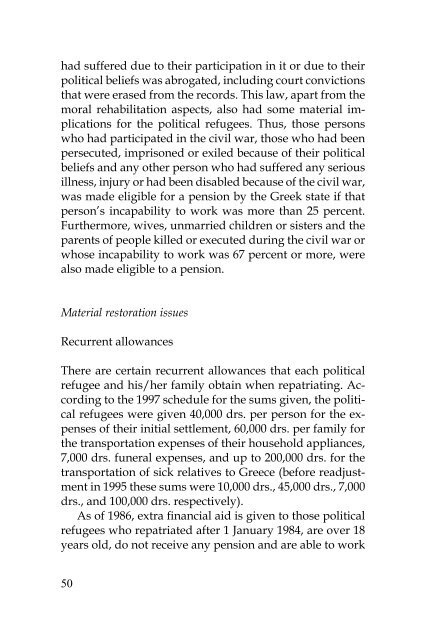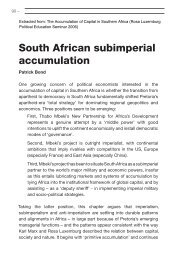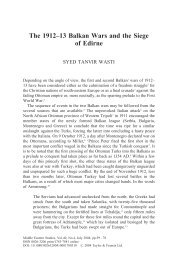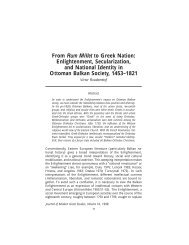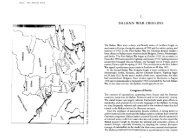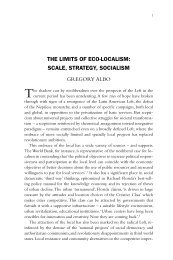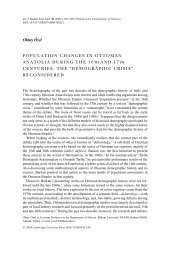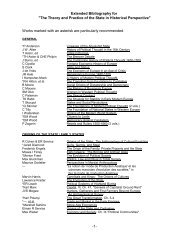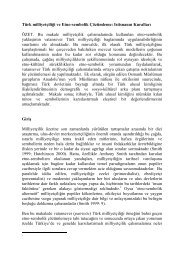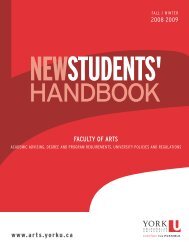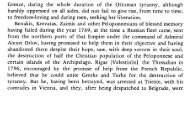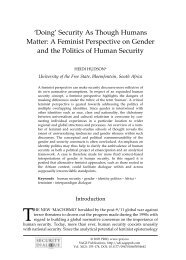The Greek diaspora in Eastern Europe and the Former Soviet Union
The Greek diaspora in Eastern Europe and the Former Soviet Union
The Greek diaspora in Eastern Europe and the Former Soviet Union
You also want an ePaper? Increase the reach of your titles
YUMPU automatically turns print PDFs into web optimized ePapers that Google loves.
had suffered due to <strong>the</strong>ir participation <strong>in</strong> it or due to <strong>the</strong>ir<br />
political beliefs was abrogated, <strong>in</strong>clud<strong>in</strong>g court convictions<br />
that were erased from <strong>the</strong> records. This law, apart from <strong>the</strong><br />
moral rehabilitation aspects, also had some material implications<br />
for <strong>the</strong> political refugees. Thus, those persons<br />
who had participated <strong>in</strong> <strong>the</strong> civil war, those who had been<br />
persecuted, imprisoned or exiled because of <strong>the</strong>ir political<br />
beliefs <strong>and</strong> any o<strong>the</strong>r person who had suffered any serious<br />
illness, <strong>in</strong>jury or had been disabled because of <strong>the</strong> civil war,<br />
was made eligible for a pension by <strong>the</strong> <strong>Greek</strong> state if that<br />
person’s <strong>in</strong>capability to work was more than 25 percent.<br />
Fur<strong>the</strong>rmore, wives, unmarried children or sisters <strong>and</strong> <strong>the</strong><br />
parents of people killed or executed dur<strong>in</strong>g <strong>the</strong> civil war or<br />
whose <strong>in</strong>capability to work was 67 percent or more, were<br />
also made eligible to a pension.<br />
Material restoration issues<br />
Recurrent allowances<br />
<strong>The</strong>re are certa<strong>in</strong> recurrent allowances that each political<br />
refugee <strong>and</strong> his/her family obta<strong>in</strong> when repatriat<strong>in</strong>g. Accord<strong>in</strong>g<br />
to <strong>the</strong> 1997 schedule for <strong>the</strong> sums given, <strong>the</strong> political<br />
refugees were given 40,000 drs. per person for <strong>the</strong> expenses<br />
of <strong>the</strong>ir <strong>in</strong>itial settlement, 60,000 drs. per family for<br />
<strong>the</strong> transportation expenses of <strong>the</strong>ir household appliances,<br />
7,000 drs. funeral expenses, <strong>and</strong> up to 200,000 drs. for <strong>the</strong><br />
transportation of sick relatives to Greece (before readjustment<br />
<strong>in</strong> 1995 <strong>the</strong>se sums were 10,000 drs., 45,000 drs., 7,000<br />
drs., <strong>and</strong> 100,000 drs. respectively).<br />
As of 1986, extra f<strong>in</strong>ancial aid is given to those political<br />
refugees who repatriated after 1 January 1984, are over 18<br />
years old, do not receive any pension <strong>and</strong> are able to work<br />
but are unemployed. <strong>The</strong>y are given a sum equal to 25 days<br />
of basic salary three times over a period of 18 months (or<br />
over a period of 30 months after 1995). As of 1993, <strong>Greek</strong><br />
nationality or citizenship is also required <strong>in</strong> order to be eligible<br />
for this aid. Apart from that, additional aid of 50,000<br />
drs. is regularly given to those will<strong>in</strong>g to be relocated <strong>in</strong><br />
Thrace. F<strong>in</strong>ally, a pension of 15,000 drs. is given to political<br />
refugees who are over 60 years of age if <strong>the</strong>y receive no<br />
pension, are unable to work <strong>and</strong> have no relatives to take<br />
care of <strong>the</strong>m.<br />
<strong>The</strong> political refugees compla<strong>in</strong> that <strong>the</strong> amounts given<br />
are too low to offer any substantial help. For example, <strong>the</strong><br />
state provides 60,000 drs. for <strong>the</strong> transportation of household<br />
appliances, whereas <strong>the</strong> real cost is no lower than<br />
100.000 drs. Fur<strong>the</strong>rmore, <strong>the</strong> bureaucratic procedures take<br />
too much time which causes difficulties <strong>and</strong> even makes<br />
some people ‘give up’ <strong>the</strong> money. F<strong>in</strong>ally, some people are<br />
considered to be <strong>in</strong>eligible for <strong>the</strong> aid even if <strong>the</strong>y fulfill <strong>the</strong><br />
requirements for it.<br />
Pensions <strong>and</strong> social security<br />
<strong>The</strong> pensions <strong>and</strong> social security issue was one of <strong>the</strong> most<br />
important matters that needed to be resolved <strong>and</strong> it was<br />
regulated, not without problems, <strong>in</strong> 1985. <strong>The</strong> transfer of<br />
pensions <strong>and</strong> <strong>in</strong>surance claims has been <strong>in</strong> force s<strong>in</strong>ce 1981<br />
for all <strong>Greek</strong> emigrants com<strong>in</strong>g from a <strong>Europe</strong>an <strong>Union</strong><br />
country. For all o<strong>the</strong>r countries it had to be regulated<br />
through bilateral agreements.<br />
As we have seen, negotiations between Greece <strong>and</strong><br />
eastern <strong>Europe</strong>an countries began <strong>in</strong> 1977, but an agreement<br />
was only reached with Bulgaria. Until 1986, <strong>the</strong> <strong>Soviet</strong><br />
<strong>Union</strong> <strong>and</strong> East Germany paid pensions to <strong>the</strong> repatri-<br />
50 51


